 Port Credit Marine Surveys & Yacht Delivery Society of Accredited Marine Surveyors 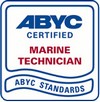 American Boat & Yacht Council  Canadian Power & Sail Squadron  BoatUS ® |
New to Diesel Engines ? Lucky You ! …..no really, lucky you. It's about time you saw the light. Power or sail, it makes no difference Diesel is the only way to go (slight prejudice showing)...... ok... not so slight. |
|
| New to Diesel Engines ? Lucky You ! …..no really, lucky you. It's about time you saw the light. Power or sail, it makes no difference Diesel is the only way to go (slight prejudice showing)...... ok... not so slight. As a marine surveyor I often deal with people buying their first diesel boat and many are a little apprehensive as they have never even seen a diesel up close. Here's the good news …. There is no more simple combustion engine anywhere. Given clean fuel, clean air, clean oil and run with some basic knowledge of how to treat them and they will last a long long time. We had 20,000hrs on our Perkins HT6-354 when we rebuilt her and she could have gone much longer but with an impending trip south and a tiny bit of slap on one piston we decided to play it safe. The bad news …. If you do not treat them right, a rebuild will cost a heck of a lot more than a gasoline engine, in fact in many cases you could buy a new gas engine for what it costs to make reparations to the diesel gods. The big newer diesels with all the computerized controls are a different matter but if you can afford a boat with these then you can afford the techie to come down and plug in his computer and tell you whats wrong so don't waste your time reading this. I am not going to turn this into a technical treatise as I don't have the patience to do that justice. This is simply a heads up for newbies. For more detailed information I highly recommend you purchase Nigel Calders' "Diesel Marine Engines" from International Marine Publishing Company (even though he says algae forms in diesel fuel, bunk !). If you are in the Toronto area Humber College runs an excellent evening diesel course over the winter months taught by James Khudoo, a superb teacher certified by ABYC® as a marine mechanic and marine electrician. Some models do suffer from various eccentricities but for the most part they are pretty much the same, if you can maintain one, you can maintain them all. For information on specific brands or models, Google up the brand and "forum". Almost all brands have a forum on the internet. |
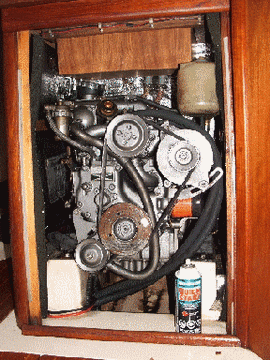 Photo #1 Can of Quickstart, no, no, no ! 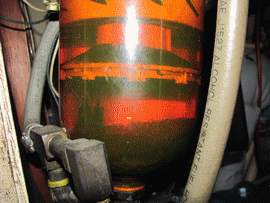 Photo #2 Filthy fuel filter, no, no, no ! |
|
| How They Work - Diesels run close to twice the compression
of gas engines, that's why spark plugs,
coils,
points and distributors are not needed.
Hit
the key and the piston pushes up the
cylinder
compressing the air that's already in there. This high
compression superheats the air and
at this
point diesel is injected into the cylinder
and the high temperature causes it
to ignite.
Diesels need a lot more air than gasoline
engines so compartment ventilation
is critical.
Diesel does not explode like gasoline but does a more controlled,
slower burn and this is why they produce
so much more torque much like the controlled
burn of us middle aged guys versus
the spontaneous
combustion of an eighteen year old. Photo # 1 shows a well planned suicide. I found that can of "Quickstart" right where you see it during a survey. Not only does it tell you that there is something seriously wrong with this engine it also suggests you do not want to be aboard when it is started. This stuff will ignite long before the piston gets to the top of its stroke and before diesel is injected into the cylinder. This can cause serious damge. DO NOT ever use this stuff in a diesel. If I am doing the insurance investigation my conclusion will be "intentional sabotage". Fuel - FYI .... Cetane in diesel is the measure of combustion and ignition characteristics and sort of relates to Octane as a measure of gasoline. There is not much you can do about this because all the marinas are supplying No.2 low sulphur diesel and this is a topic that could use up all the space on my website so let's just concentrate on the things we can control. Fuel injectors and fuel injection pumps operate under extremely fine tolerances, mucky fuel like the stuff in Photo # 2 will shut you down ! Most people will change the oil once a year and only change the fuel filter if they have too or if the mechanic tells them to. Dumb ! It will cost you about $90 per cylinder to rebuild the injectors (if you take out and reinstall yourself) and as much as a few thousand dollars to replace or rebuild the injection pump. How much was that fuel filter ? Air - Since we've established that we need air lets try and keep it clean. Many boats I see have rotten and disintegrating sound insulation, Photo # 4. The air intake on your diesel is going to suck these rubber, foam, compressed fiber board particles in and they are not a good diet for diesels. If you have a turbo diesel the situation is even more critical.Many boats have some type of air cleaner and they are rarely changed. Over time they will become saturated with oil, sound insullation and whatever else they can suck in. This will cost you significant fuel $$$. My air filter is $135.00 but change it I must. . I was once talked in to using Marvel Mystery Oil as a fuel additive as my engine was so old. Within a week all of the seals in my lift pump had dissolved, coincidence ? No more fuel additives ! As with oil, all the refineries have their own additive package. What are they ? I don't know and I don't know what is in the magic stuff they sell in the autoparts store so I'm not putting it in my boat. Many people use a biocide additive to kill the bacteria (NOT algae) that grows at the interface of the diesel and water that inevitably builds up in the bottom of your tank but all that does is cause a billion bacteria corpses to coagulate into sludge that much more quickly. Go griusing, nothing will clean your fuel better. A majority of the fuel pumped to your engine is recirculated through the filter and back to the tank. Diesels actiually self polish the fuel. Mandated lower sulphur content is a highly controversial and complex issue with refineries,ecologists, governments and engine manufacturers all squabbling about the composition of diesel, so once again let's stick with what we can control. As diesel ages it looses cetane and the moisture separates and settles at the bottom of your tank (how water gets there is another complex issue but trust me its there). Bacteria (NOT algae) grows at the water/diesel boundary and turns into black sludge which you will see in your nice clear filter bowl. My point ? Old fuel sucks and will cause your engine to run rough and blow a lot of smoke if you can get it started at all. Solution : Use your boat so fuel doesn't sit there for two years. If you are buying a boat that has been little used investigate the cost of having the fuel removed, it ain't cheap. Before going to the boat, go to a gas station and smell the diesel fuel spout. Now go to the boat and stick your nose in the fuel fill fitting . Fresh diesel will have a strong odour while old fuel will have lost much if not all of its smell. Fuel Filters - Always have spare fuel filters on board and know how to change them. This will include knowing how to bleed your fuel system of air. If you are lucky your fuel filter/water separator will have clear bowl. If you see black gunk (technical term for bacteria) floating around or you see water at the bottom, change the filters now. Filters should be changed at the end of each season and whenever the see-thru bowl isn't see-thru anymore (check your engine manual). I have never had a problem with non-OEM brand fuel filters. Better yet, add a vacuum gauge at your fuel filter and let it tell you when you need to change the filters. Oil - Neither you nor I will ever know what chemical additives are in the oil you buy and each brand have their own proprietary formulations but there are differences. Stick with the brands and weights published in your engine manual, they put a lot of thought into that. I've had only one issue with oil. I once used Shell Rotella where all the additives had separated and settled at the bottom of the container. I've never seen brown smoke before ! I now look in the bottom of the jug before I pour. Oil filters - After we rebuilt the Perkins I installed Fram oil filters that were listed as equivalent to the Perkins Filters. After weeks of trying to figure out why a rebuilt diesel was smoking like a banshee I came across an old English Perkins mechanic who told me I was an IDIOT to put anything but a Perkins filter on it. Put one on …. smoke gone instantly ! In the meantime I had pulled all the injectors and turbo trying to solve the problem. While The Perkins unit had a pressure relief valve that the Fram did not. Many after market parts are just as good as OEM but you will not find me using after market oil filters again. Cooling - There are two types of cooling systems on boats whether gas or diesel. 1. Raw water cooling - seawater is drawn in to circulate through the engine then expelled through the exhaust. This system cools both the exhaust and engine. 2. Closed cooling, sometines referred to as "fresh water cooling" still draws in seawater to cool the exhaust but a separtate "closed" system cools the engine. This system has a heat exchanger that functions like your car radiator and cools the engine. Just like your car you must check the coolant level regularly. This heat exchanger will have a cap like your radiator cap. You must check the level of this coolant frequently. see Photo # 5 If you have a closed cooling system coolant is circulated by a pump on the engine much like the one on your car.Chances are good it will last as long as the engineand requires no maintenance. Whether raw or fresh water cooled your seawater pump is a different matter. The pump shown in Photo # 6 shows burned paint, a sure sign of overheating. Overheating a diesel can destro it in a few minutes. This pump has an impeller (Photo # 7) with neoprene vanes and most certainly does need routine attention. When they fail, they do so instantly and without warning so always have a spare on board. At the very least they should be removed every fall or they will develop cracks and become brittle. I prefer to put in a new one every year. Even if cracks don't develop the bond between the brass bushing and the neoprene part can fail with age leaving you with an impeller that looks fine but will not turn. I have seen this kind of failure in an unused impeller that had been on the shelf for a number of years. Chances are very good that failure will occur at start-up or when the boat is started at spring launch and before you get to your slip you will notice you are trailing giant clouds of white smoke ……. Very expensive …. thousands of dollars damage can occur in just a few minutes. Immediately after starting always look at your exhaust and see that lots of water is coming out. Smoke - No smoke is best but many diesels generate a little especially older models without the newfangled electronic fuel controls. If you get a little smoke on start-up and it goes away after a minute or two, don't worry about it. Ok it's a little more complicated than this but hey! this is just a primer …. white smoke is generally related to water due to cracked head , head gasket or cylinder or if the impeller in your seawater pump fails you will get a a very large white cloud following you as the water already in the system boils off. White smoke can also sometimes be due to unburned but atomized fuel possibly due to contaminated fuel. Blue smoke is due to burning oil, probably worn rings or perhaps too much oil in the crankcase and black smoke is inadequately combusted fuel from bad injectors, worn injection pump or even from an improper propeller which could overload the engine. As a routine matter you should check your coolant and ensure there is no oil in it and check your oil to ensure there is no water in it. The above is a very simplified explanation. Running - Diesels run at approx. 180° - 190°F and as a by product of combustion produce considerable moisture which is burnt off the cylinder walls when the engine gets up to full operating temperature. A diesel will never get up to full temperature idling and should never be idled for more than a few minuts.; it must be put under load to get up to temperature. Diesels should never be run hard until they are at full temperature as all the various metals which expand and contract (more than gas) at different rates must be allowed to equalize. The same applies in reverse when cooling down. Abruptly shutting off a hot diesel is a brutal thing to do to all the metals involved and will leave considerable condensate (can happen from proteacted idling too) in the engine. If you want to see how not to run a diesel and shorten its life by 50-60% go to any yacht club on a Wednesday night. All the sailboats are fired up, leave the harbour at full throttle and then are shut down so that they can get the sails up and go racing. The process is repeated on the way back to the bar. The engines never get a chance to warm up or cool down properly and this takes years off their lives. Consult your engine manual, it will tell you the optimum termperature and RPM to run at. This is not just for fuel efficiency but also for longevity. Immediately after starting up always look at your exhaust and see that lots of water is coming out. So Bottom line ….. clean air, clean fuel, clean oil, photo #8 - run for 20,000 hours, sounds good to me :) PS #1. If this hasn't bored you to tears you might want to check out "Boat Maintenance For (non) Idiots" . I also have a few tips on inspecting diesel engines in Marine Survey 101 that may be of interest. PS #2. If you really want to get into this or already have a diesel that you want to know more about you can join boatdiesel.com for about $20 a year. This forum has some real gurus who can tell you just about anything you need to know about your entire diesel drive train. PS #3. My friend Craig Morley AMS runs weekend diesel courses a couple of times a year, lately at Etobicoke Yacht Club. Craig runs an excellent hands on course with an actual engine., well woth the investment. PS #4. Ok gearheads I know I've cut a few corners and may have oversimplified a few things but give me a break on this one. I'm just trying to make that first step a little easier. Need a marine surveyor in Ontario... See this list of Every Marine Surveyor in Ontario 
|
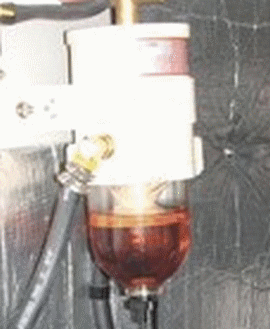 Photo # 3 Air in filter, no, no, no ! 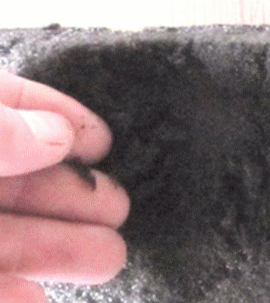
Photo # 4 Disintegrating insulation 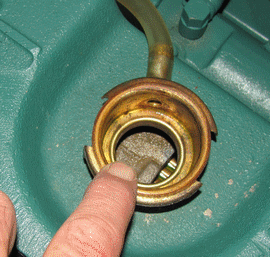
Photo # 5 Where's the coolant ? 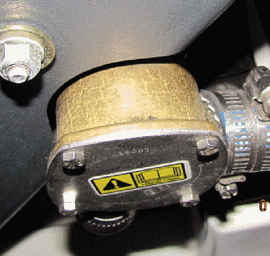 Photo # 6 Photo # 6Overheated raw water pump 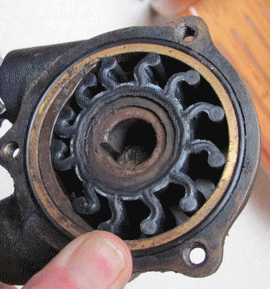 Photo # 7 Neoprene impeller in pump above 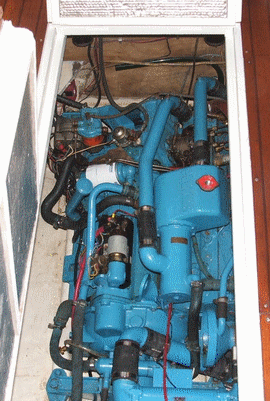 Photo # 8 40 year old Clean engine, yes, yes, yes ! |